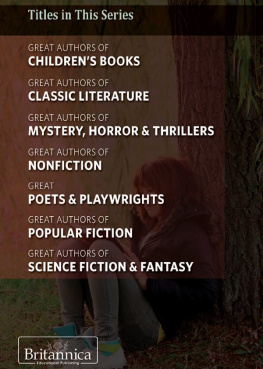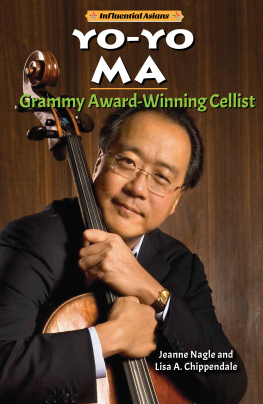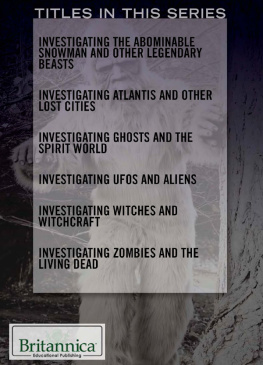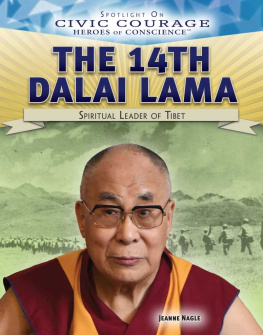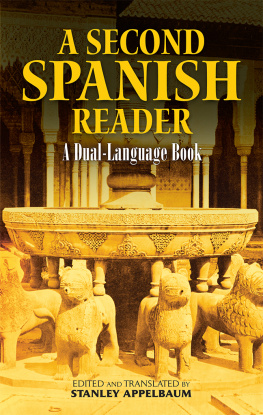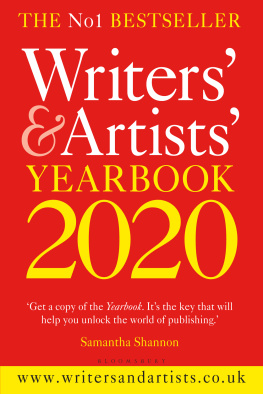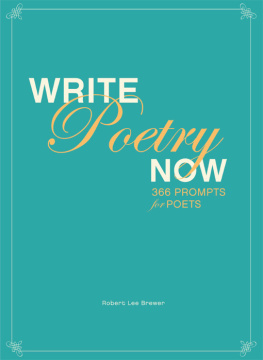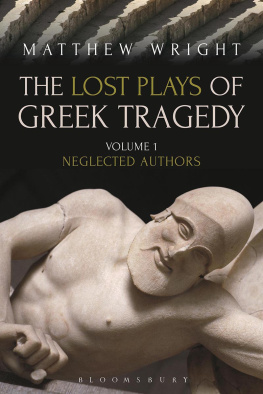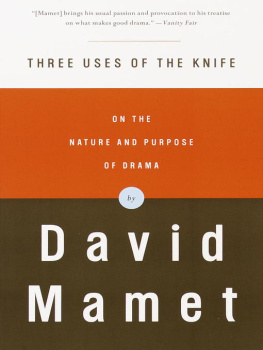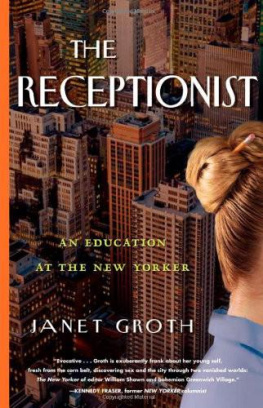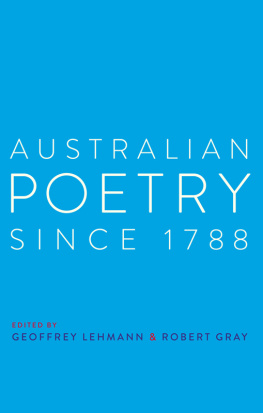

Published in 2014 by Britannica Educational Publishing (a trademark of Encyclopdia Britannica, Inc.) in association with The Rosen Publishing Group, Inc.
29 East 21st Street, New York, NY 10010
Copyright 2014 The Rosen Publishing Group, Inc. and Encyclopdia Britannica, Inc.
Encyclopaedia Britannica, Britannica, and the Thistle logo are registered trademarks of Encyclopdia Britannica, Inc. All rights reserved.
Distributed exclusively by Rosen Publishing.
To see additional Britannica Educational Publishing titles, go to www.rosenpublishing.com.
First Edition
Britannica Educational Publishing
J.E. Luebering: Director, Core Reference Group
Anthony L. Green: Editor, Comptons by Britannica
Rosen Publishing
Hope Lourie Killcoyne: Executive Editor
Jeanne Nagle: Senior Editor
Nelson S: Art Director
Brian Garvey: Designer, Cover Design
Cindy Reiman: Photography Manager
Introduction by Heather Moore Niver
Cataloging-in-Publication Data
Great Poets & Playwrights/[editor] Jeanne Nagle. First Edition.
pages cm. (Essential Authors for Children & Teens)
Includes bibliographical references and index.
ISBN 978-1-62275-089-4 (eBook)
1. AuthorsBiographyJuvenile literature. 2. LiteratureHistory and criticismJuvenile literature.
I. Nagle, Jeanne, editor of compilation.
PN451.G76 2014
809.003dc23
[B]
2013029269
On the cover: Featured are (top, left to right) playwright David Mamet, poet Maya Angelou, and William Shakespeare. Astrid Stawiarz/Getty Images, Ken Charnock/Getty Images, Stock Montage/Hulton Archive/Getty Images
Cover, p. 3 prudkov/Shutterstock.com; interior pages (books) iStockphoto.com/AnthiaCumming, (quill and inkwell) iStockphoto.com/esolla
Contents
L ook around. Poets and playwrights are everywhere. Writers of poems are mothers like Maya Angelou and wild socialites like Lord Byron. They might come from money or struggle to pay their bills. Their writing might be personal or political, or even both, like the works of poet Wislawa Szymborska. Some stick to one genre, while others express themselves through several, like poet, playwright, and essayist Diane Ackerman. Whatever fame or influence their writing may win them, poets and playwrightsincluding the noteworthy individuals called out in the pages of this bookare, first and foremost, people.
Many of the profiled dramatists and poets worked other jobs for all or part of their lives. (It is tempting to imagine their minds drifting far away from the work at hand, conjuring up scintillating verses for poems or breathtaking plots and unforgettable stage characters while toiling away.) Englands John Keats diligently studied to become a surgeon but found it meant nothing to him compared to poetry. T.S. Eliot worked as a banker and teacher before becoming an editor and a writer. Playwright Arthur Miller worked in a warehouse to make enough money to go to college, and Joseph Brodsky supported his writing with low-paying jobs.
Other authors in the poetry and drama genres were fortunate to spend much of their careers immersed in their craft. Playwright David Mamet, for example, studied theater and then went on to act and write dramas for the stage. The French playwright Molire honed his sense of dramatic structure when he became a strolling player, working as an actor and theatrical manager instead of following his father in the upholstery trade or even using his education in law. Poet Adrienne Rich was selected as one of W.H. Audens Yale Younger Poets before graduating from college; she went on to write powerful political poems, essays, and literary criticism. Roman poet Virgils financial security allowed him to wile away his days studying other poets and writing. He spent 10 years writing the Aeneid alone.
Many poets and playwrights have rid themselves of inner demons through verse and drama. When Eugene ONeills wild lifestyle landed him in bed with tuberculosis, he started reading Henrik Ibsen and August Strindberg and was inspired to write his own plays, which focus on societal and personal ills. Others have chosen to reveal their sunnier sides, reveling in the joy, fun, and just plain goofiness of life. Englands Michael Rosen penned poems with such joyful titles as Dont Put Mustard in the Custard, which were rumored to be based on people and events in his own life. Shel Silverstein is best known for his childrens stories, such as Who Wants a Cheap Rhinoceros?, and poetry for kids, which he illustrated himself.
All authors writing about the human experience draw from their own experiences to create their art. Learning about the lives of the poets and playwrights profiled in these pages brings into sharp focus that while these men and women were extraordinarily talented, they were simply people nonetheless.
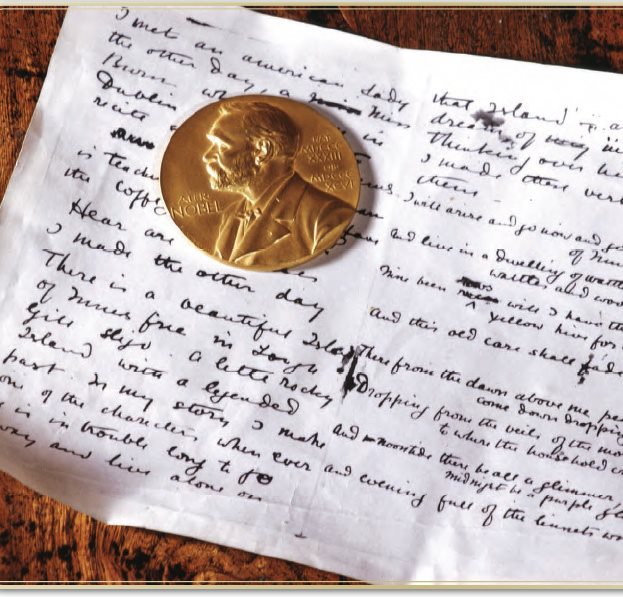
The Nobel medal won by Irish poet William Butler Yeats in 1923 rests atop one of the writer's manuscripts, on display in a Sligo (Ireland) museum. Epics/Hulton Archive/Getty Images
(b. 1948 )
A merican Diane Ackerman writes poetry and drama that often reflect her interest in natural science. She considers amino acids, quasars, and corpuscles to be as much in the realm of poetic experience as anything else in the universe.
Ackerman was born on Oct. 7, 1948, in Waukegan, Ill. She was educated at Pennsylvania State University (B.A., 1970) and Cornell University, Ithaca, N.Y. (M.F.A., 1973; M.A., 1976; Ph.D., 1978). From 1980 to 1983 she taught English at the University of Pittsburgh, Pa., and from 1984 to 1986 she directed the writers program and was writer in residence at Washington University, St. Louis, Mo. She later was a staff writer at the New Yorker magazine (198894).
She first published her poetry in Poems (1973), a chapbook written with Jody Bolz and Nancy Steele. In The Planets: A Cosmic Pastoral (1976), she drew on time spent with space scientists at Cornell, while later works such as Jaguar of Sweet Laughter: New and Selected Poems (1991) include nods to her literary influences as well as ruminations on the natural world. Ackerman also contributed to Beyond the Map (1995) and published poems reconciling the positive and negative aspects of human life in I Praise My Destroyer (1998). The poems in Origami Bridges (2002) stem from her time in psychotherapy.
Ackerman wrote a series of nine radio programs for the Canadian Broadcasting Corporation under the title Ideas into the Universe (1975), and she was a contributor to Other Worlds (1975) by Carl Sagan. She also wrote Twilight of the Tenderfoot: A Western Memoir (1980) and the play Reverse Thunder (1988).
(b. 525d. 456 BCE)
T he first great tragic dramatist of Greece was Aeschylus. His plays focused on the conflicting concerns of political leaders for their people and for themselves.
Little is known of Aeschyluss youth. He was probably born and grew up in Eleusis, northwest of Athens. He was recorded as having entered the Dionysia, Athenss major dramatic competition, shortly after its reorganization in 501 or 500 BCE. He won his first success in the theater in 484 BCE at the age of 41.

